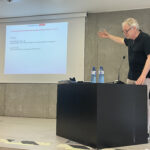14 juliol, 2021
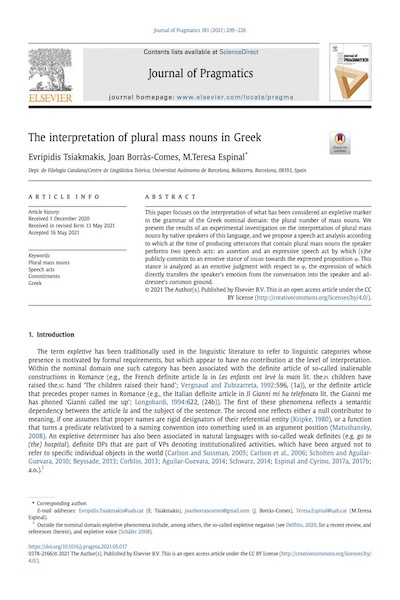
Autors:
Evripidis Tsiakmakis, Joan Borràs-Comes, M.Teresa Espinal
Títol:
The interpretation of plural mass nouns in Greek, Journal of Pragmatics 181Editorial: Elsevier
Data de publicació: Agost 2021
Més informacióThis paper focuses on the interpretation of what has been considered an expletive marker in the grammar of the Greek nominal domain: the plural number of mass nouns. We present the results of an experimental investigation on the interpretation of plural mass nouns by native speakers of this language, and we propose a speech act analysis according to which at the time of producing utterances that contain plural mass nouns the speaker performs two speech acts: an assertion and an expressive speech act by which (s)he publicly commits to an emotive stance of dislike towards the expressed proposition φ. This stance is analyzed as an emotive judgment with respect to φ, the expression of which directly transfers the speaker's emotion from the conversation into the speaker and addressee's common ground.
29 desembre, 2022
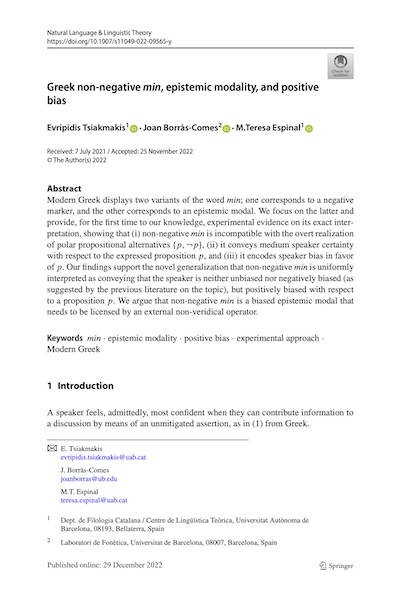
Autors:
Evripidis Tsiakmakis, Joan Borràs-Comes & M.Teresa Espinal
Títol:
Greek non-negative min, epistemic modality, and positive biasEditorial: Natural Language & Linguistic Theory (Springer)
Data de publicació: 29 de desembre del 2022
Text completModern Greek displays two variants of the word min; one corresponds to a negative marker, and the other corresponds to an epistemic modal. We focus on the latter and provide, for the first time to our knowledge, experimental evidence on its exact interpretation, showing that (i) non-negative min is incompatible with the overt realization of polar propositional alternatives {p,¬p}, (ii) it conveys medium speaker certainty with respect to the expressed proposition p, and (iii) it encodes speaker bias in favor of p. Our findings support the novel generalization that non-negative min is uniformly interpreted as conveying that the speaker is neither unbiased nor negatively biased (as suggested by the previous literature on the topic), but positively biased with respect to a proposition p. We argue that non-negative min is a biased epistemic modal that needs to be licensed by an external non-veridical operator.
3 setembre, 2019
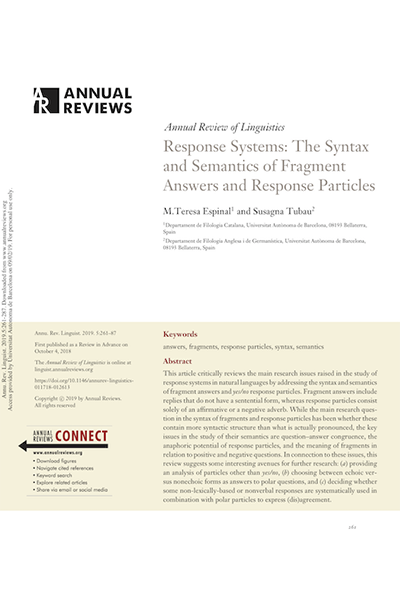
Autors:
M.Teresa Espinal i Susagna Tubau
Títol:
Response Systems: The Syntax and Semantics of Fragment Answers and Response ParticlesEditorial: Annual Review of Linguistics
Data de publicació: 20 de gener de 2019
Pàgines: 28 Més informació
Text complet
This article critically reviews the main research issues raised in the study of response systems in natural languages by addressing the syntax and semantics of fragment answers and yes/no response particles. Fragment answers include replies that do not have a sentential form, whereas response particles consist solely of an affirmative or a negative adverb. While the main research question in the syntax of fragments and response particles has been whether these contain more syntactic structure than what is actually pronounced, the key issues in the study of their semantics are question–answer congruence, the anaphoric potential of response particles, and the meaning of fragments in relation to positive and negative questions. In connection to these issues, this review suggests some interesting avenues for further research: (a) providing an analysis of particles other than yes/no, (b) choosing between echoic versus nonechoic forms as answers to polar questions, and (c) deciding whether some non-lexically-based or nonverbal responses are systematically used in combination with polar particles to express (dis)agreement.
27 octubre, 2020
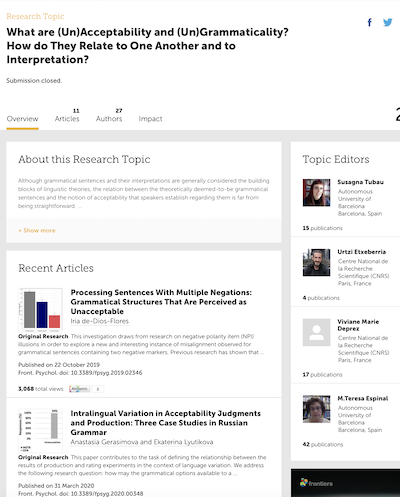
Autors:
S. Tubau, U. Etxeberria, V. Déprez i M.T. Espinal (coeditors)
Títol:
Research topic: What are (un)acceptabiity and (un)grammaticality? How do they relate to one another and to interpretation? Frontiers in PsychologyEditorial: Frontiers
Data de publicació: 2020
Més informacióAlthough grammatical sentences and their interpretations are generally considered the building blocks of linguistic theories, the relation between the theoretically deemed-to-be grammatical sentences and the notion of acceptability that speakers establish regarding them is far from being straightforward.
Some grammatical sentences that present parsing complications (e.g. garden-path sentences) might appear unacceptable to speakers, as they are difficult to understand. Other sentences, considered as ungrammatical by theoreticians (e.g. wh-island violations, sentences with resumptive pronouns, semantically implausible sequences, and sentences with unlicensed negative polarity items) might be perceived as acceptable by speakers and lead to reliable interpretations.
To further complicate matters, recent research on how grammatical 'illusions' (e.g. negative polarity item licensing, and comparative illusions) are perceived, understood and processed has revealed that speakers can subconsciously correct ungrammatical or ill-formed sentences by making use of specific repair strategies. Studies have also revealed that adults can learn to understand novel constructions considered to be syntactically ungrammatical (e.g. the ‘needs’ construction).
Taking into account these experimental results, there is now a fundamental need for novel operational, empirically and theoretically grounded redefinitions for core notions such as:
(un)acceptability; (un)grammaticality and, finally, the continual exploration of the existing complex interactions between sentences’ (un)acceptability and (un)grammaticality and their final interpretation.
In this vein, it seems necessary to evaluate how suitable specialized research methods can be, to establish the degree and extent to which particular linguistic structures and their interpretations are acceptable or unacceptable to speakers and how this can reliably relate to theoretical (un)grammaticality. If necessary, more analytic methodologies (e.g. acceptability scales, elicitation techniques, time forced-choice tasks, etc.) must be developed in order to provide dependable results informing on linguistic theory. This should lead to (i) a better understanding of what makes (un)grammatical sentences (un)acceptable or the other way around, (ii) a better account of speaker’s preferences and optionality in connection to (un)acceptability and (un)grammaticality, and (iii) the role of performance factors, memory limitations, and processing mechanisms in the evaluation of (un)acceptability, (un)grammaticality, and interpretation of linguistic structures.
We welcome manuscripts addressing any of the following topics and subtopics from theoretical and/or experimental perspectives, covering a wide range of languages and linguistic structures:
-What is (un)acceptability in linguistics?
-How does (un)acceptability relate to (un)grammaticality?
-Methodological issues related to (un)acceptability and/or (un)grammaticality.
-How are speaker's preferences and optionality connected to (un)acceptability and (un)grammaticality?
-What factors are relevant for the evaluation of (un)acceptability, (un)grammaticality, and interpretation of linguistic structures?
13 abril, 2021
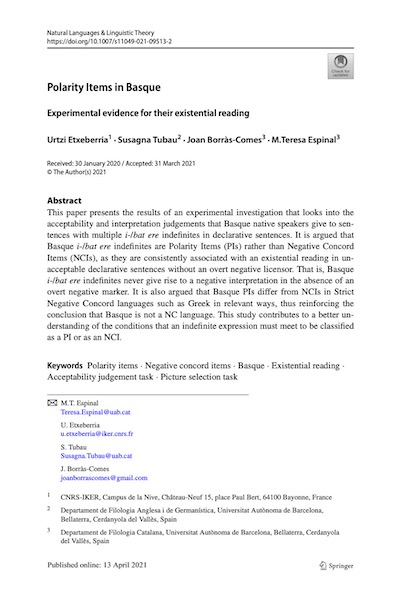
Autors:
Urtzi Etxeberria, Susagna Tubau, Joan Borràs-Comes & M.Teresa Espinal
Títol:
Polarity Items in BasqueEditorial: Natural Language & Linguistic Theory, Springer
Data de publicació: 13 d'abril del 2021
This paper presents the results of an experimental investigation that looks into the acceptability and interpretation judgements that Basque native speakers give to sentences with multiple i-/bat ere indefinites in declarative sentences. It is argued that Basque i-/bat ere indefinites are Polarity Items (PIs) rather than Negative Concord Items (NCIs), as they are consistently associated with an existential reading in unacceptable declarative sentences without an overt negative licensor. That is, Basque i-/bat ere indefinites never give rise to a negative interpretation in the absence of an overt negative marker. It is also argued that Basque PIs differ from NCIs in Strict Negative Concord languages such as Greek in relevant ways, thus reinforcing the conclusion that Basque is not a NC language. This study contributes to a better understanding of the conditions that an indefinite expression must meet to be classified as a PI or as an NCI.







